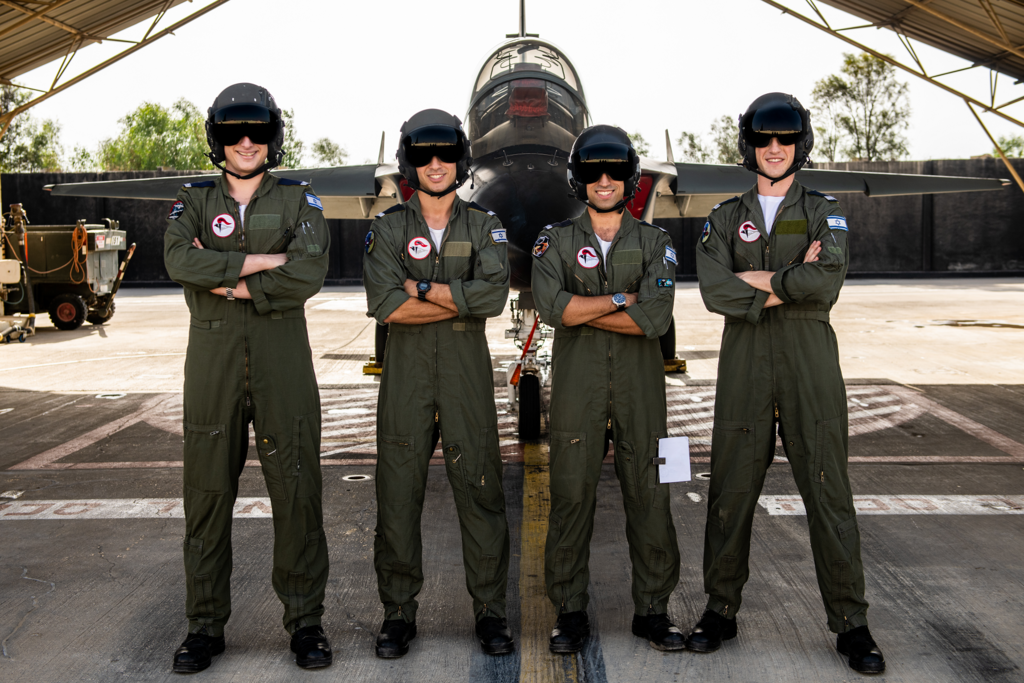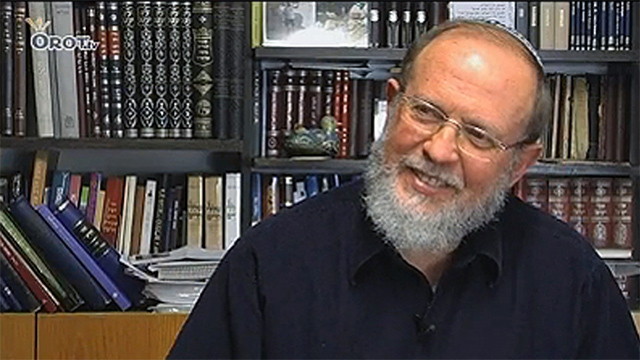Bnei David in the West Bank settlement of Eli has created a new record: For the first time, the graduates of the IAF pilots' course includes four students from the same yeshiva and mechina pre-army preparatory program.
Alongside them are another 35 graduates, one of whom is a religiously observant woman, at a ceremony that also marked 40 years since Operation Opera, during which the nuclear reactor in Iraq was destroyed.
Of the four graduates - all of whom are aged 23 - two are named 1st Lt. Y., live in the West Bank and had their weddings during the course.
“I went to the Advanced Yeshiva in Eli to learn about myself, to deepen my religious knowledge and to open my mind to various worlds,” 1st Lt. Y., a combat navigator, told Ynet.
“That’s also where I met my classmates in this course - 1st Lt. N., 1st Lt. A. and 1st Lt. Y.”
Before joining the army he never thought he would be part of a flight crew, “but from the moment I signed up, I had no more indecision. I realized that I was in the right place for me. A place in which I can give of myself and contribute the most, which challenges me and takes me to the edge.” He defines the three years of the course as a “roller coaster.”
1st Lt. A., a transport navigator, is from Petah Tikva, and never even thought about joining the air force. It was only the challenge that attracted him to the screening interviews.
“I felt connected to the yeshiva. I brought my rabbi from the mechina, who influenced me a lot, to meet my air force commander. I had many long conversations and hours of joint learning with my rabbi, so I have no doubt that his worldview had a significant impact on mine. We are still in touch today.”
'Doing the best we can'
1st Lt. N., a combat navigator, originally from Emek HaMaayanot Regional Council in northern Israel, came to the air force screenings after a year and a half at the mechina, and when he was accepted he began as a helicopter cadet but later switched to combat navigation. 1st Lt. Y., on the other hand, who is from the Binyamin Regional Council, remained in the helicopter course.
He studied at the Advanced Yeshiva in Eli for two years, and describes that period as one of personal development.
“It was obvious to me that I wanted to make a significant contribution to the army,” he says, “and from my point of view, the two years in Eli were a significant stage on the path to where I am now.”
He says that he always wanted to be part of a flight crew.
“That was my dream from childhood, unlike my friends, who just happened to end up here. I can’t say whether I influenced my friends to come to the course, but we had days when not everything was bright and glorious, the way it sounds today, now that we are excited and happy. Still, I was there for my friends, pulling them up when they felt down.”
“I felt it was the place where I could maximize my abilities,” adds Y., “and be a professional combat soldier who also contributes intelligence and knowledge.”
“Sometimes the course was really hard,” admits Y. from Binyamin, “especially when a year and a half of it was during the Corona restrictions, and the social distancing affected our daily routine. At such times you have to realize how much you want to fight in the long term, and to invest in what you are doing. There were days when we felt down, and we discussed among ourselves how much we wanted to stay here - and we always concluded that this is our place and we want to do our very best.”
“The Corona period was especially difficult,” adds Y. from Shomron, “because we were not allowed to go home. For me and for Y., it was even more challenging, because we have wives whom we couldn’t see regularly. We talked among ourselves about how to boost our morale and how to turn that period into something else. Then the four of us decided to make our Shabbats more fun, so that they would remind us as much as possible of our days at the mechina in Eli and of Shabbats at home. This translated into putting more effort into Shabbat meals, learning more Torah together, having more in-depth discussions, and that gave us the strength to keep moving forward.”
'Faith strengthens'
Among the course students the four were nicknamed the “religious gang,” something that became a kind of inside joke.
“There is no doubt that our WhatsApp group kept our spirits up and our religious observance was definitely a bonding factor. N., for example, constantly spoke about the days that would follow their completion of the course.
“We all imagined how we would buy motorcycles together.”
After that we got a college degree, and that was a very challenging period too, and A. constantly reminded us about the advantages of academic studies, and that ultimately they would be part of our training.”
The ceremony was an exciting milestone in their lives, and they were eagerly anticipating it.
“We’ve been looking forward to this for a very long time,” says. Y.
“I am really thrilled by the thought of standing on the parade ground with ten thousand people in the stands, and we have to show them our very best, even though we have drilled until we are doing things automatically.”
What is special about Eli that it managed to produce the four of you from a single cohort?
“From the first day we arrived at the mechina, we were guided toward a life of meaning and giving our very best,” says 1st Lt. N.
“Whether we are discharged from the army after 30 years, or finish our compulsory service and go into high-tech. This is not so simple when it starts from a young age, but we all came with the same mindset of a sense of mission, doing and making a difference. Even now, when we look forward, it seems a bit daunting that for another nine years we will be in the same framework and won’t be able to get out of it. But when I look at myself from the perspective of my values, that helps me to deal with issues like that too.”
Y. from Binyamin explains that he and his friends from Eli drew strength from their faith.
“We are all in this together, religious and secular alike,” he says. “But the values world that we absorbed in our parents’ homes and that was built further at the yeshiva and the mechina in Eli, certainly helped us bond together and gave us a lot of strength. Each of us has an inner engine that can gather the strength to continue forward and cope. Having faith along the way definitely gives strength. As men of faith we put our trust in God to help us and give us strength and to overcome any difficulties - and that is encouraging.”
Y. from Shomron adds that a military career is part of the aspiration to live a life of faith and meaning. “This can find expression in learning Torah, in being a rabbi, educator, public figure or businessman, and even a career soldier, which is no less a mitzva than the careers I mentioned before, as long as a person is conducting himself and living with mindfullness of his faith, while doing good. We have abilities that we decided to maximize and put into practice in our military service.”
Challenges and advantages
The four graduates reject the claim that religious cadets find prestigious courses more difficult, to the point of failure, and call that claim a myth.
“It is important that people realize that our being religious poses challenges that others don’t face,” says Y. from Binyamin, “but on the other hand, there are also advantages that actually help us succeed.”
One example is Shabbat.
“Before the navigation exercises and the prior to officers training, that are a lot of preparations and arrangements. The religious cadets of course do not write and do not prepare on Shabbat. So on the one hand that forces us to work harder and finish everything before Shabbat starts, but on the other hand there is no better feeling than coming back to our rooms after a Shabbat meal and just resting and relaxing.”
Y. notes that there were a few other cadets who adopted their methods, “and whoever didn’t - told us more than once that they don’t understand how we finish everything so quickly, and that they are jealous of us. The same thing happened during our year of academic studies. Then too, Shabbat was a day of rest for us."
Y. from Shomron asks to add that “what made it possible for us to meet all the course requirements and still remain faithful to ourselves and our beliefs were the other cadets who accept us. Sure, there was a lack of knowledge and an initial lack of familiarity, and it took a while until we overcame the preconceived ideas and the differences between us, which at first created difficulties and tensions. But those gradually evaporated over time.”
They would like to see “more young people from our circles applying to the air force screenings. I understand the fears of the stigmas from the past, that the air force is a secular place, but we have come a long way since then, so anyone who is undecided because of his religious commitment can stop worrying about that. Not only does the course not hinder religious cadets, it actually built up our strengths, that might not have been nurtured in some other course.
“In the end,” says A., “we are all here to serve and to give of ourselves to the army, and everything depends on the mindset that you bring to the army and how you do your service. Anyone coming here can expect a long path, but one that is significant and worth striving for.” “We all live here in peace,” says N., “despite our different ideas and opinions. The most important thing is not to pass judgment on others too quickly.”
Rabbi Eli Sadan, the dean of the pre-army academy in Eli and its founder - for which he won the Israel Prize - is especially proud today. “It is very exciting that we have a respectable representation in the air force, a prominent operational arm in Israel’s security. This is a testament to the quality of the students who come to us,” he said.
“I am happy and proud to see our students studying, improving, asking questions and even stumbling,” says Yishai Tzur, a rabbi at Bnei David, “but always moving forward. It is also a great privilege for them to be participating in something so tremendous.”



